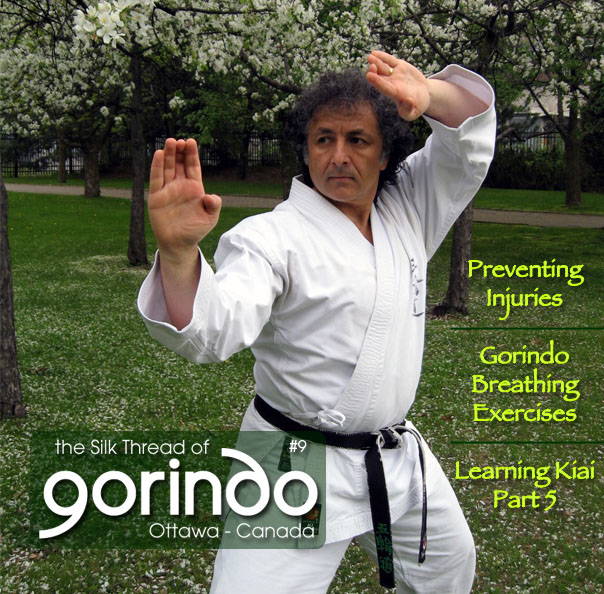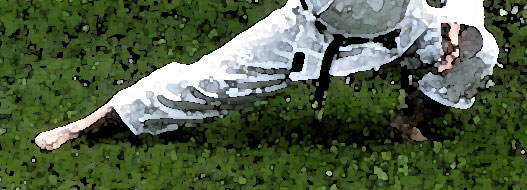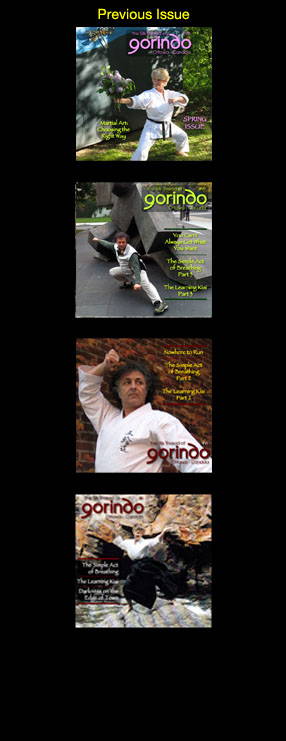
The Silk Thread of Gorindo - Ottawa - Canada
Issue 9
Photo cover Claudio Iedwab sensei by the Ottawa River, May 2011, by Roxanne Standefer
Preventing Injuries
These guidelines are important to follow to keep your exercise program safe, enjoyable and productive.
Attitude...• Maintain a Positive Attitude.
• Give the best of yourself and be enthusiastic during your practice.
• Don’t participate in the class if you are distracted, although a short period of warm-up and meditation before the class will help you to find your focus.
• Ask if you have doubts or questions about a technique. The only stupid question is the one not asked.
• Practice to improve the techniques that have already been taught to you, when working by yourself or with fellow students.
• Be respectful with yourself. Maintain mental focus.
• Train to enjoy the practice of martial art.
Warm-up & Cool-down . . .
• Always do the appropriate standard warm-up, it is vital to the training. Do not enter the class directly without these preliminary exercises. Warm-up exercises should raise the pulse rate, gently loosen joints and prepare muscles for more intensive work in the class. Elevate body temperature to warm the muscles before doing light stretching exercises.
• After training, the cool-down period of light stretching, rotational exercises and relaxation is equally important as the warm-up. It will help reduce the incidence of sore or pulled muscles and aggravated injury.
In the Class . . .
• Always use a progressive increase of repetitions, intensity, speed, rhythm, and level of technique. Don’t begin the class with your highest kicks or full power movements.
• Use correct technique and mechanics of the body.
• Ensure that your clothing is loose and comfortable. Tie long hair back with a soft elastic, no metal or elastic clips, please. Remove jewellery.
• Don’t be aggressive or competitive during the classes; everybody has a different rhythm, level and individual aptitude. Practice “within” yourself instead of “against”. Don’t feel compelled to better someone else’s speed, intensity or height of kick. Also don’t show off! To obtain the greatest benefit your progress must be graduated.
• Don’t sacrifice control of any technique for the sake of speed or power. Accuracy and Control (being able to stop the technique mid-stream and not injure a partner (or yourself) is ultimately more important.
• Follow the program. Pay attention to the lessons, rhythm, explanations and advice. If the teacher suggests not kicking or refraining from further practice at the end of a class, there is generally a very good reason to follow the advice. Don’t spoil the previous hour of hard work by deciding to implement your own plan. Bow to experience.
Outside the Dojo . . .
• Don’t forget that your activities outside the program will have a direct influence on your training. Other sports, work schedule, diet and sleep will strongly affect your body’s metabolism and preparedness. Be careful and moderate.
Dealing with Illness & Injuries . . .
• Be regular in practice. Don’t try to make up for a missed week in one day.
• Don’t overtrain. This can lead to illness and injury, not to mention eventually diminish your enthusiasm for training. It is recommended to take a day off between practice sessions. Let your body rest. This is when most of the valuable strengthening takes place. If you are keen to learn, try reading a recommended book.
• Do not train through pain. Some muscle soreness at the beginning of the program or when a new exercise is introduce is normal. However if this does not pass in a couple of days you may have an injury. If you do have an injury, make sure that you give it sufficient time to heal. Consult with your Doctor and with your Teacher about modifications to your training. There are many therapeutic exercises that will help the healing process. Continued aggravation of even a minor injury can mean serious problems later on. There are usually many aspects of the class that you can participate in that do not affect the injured area.
• Don’t train if you are feeling sick. Not only will you deplete your body’s defenses, you may be ignoring important signals from your body to rest. However if you are just feeling tired remember that the training will envigorate you. Train for enjoyment of your health.
by Claudio Iedwab & Roxanne Standefer
(originallly published in the Gorindo Student Manual)
Photos by Roxanne Standefer / Artwork by Claudio Iedwab
- Martial Arts: Choosing the Right Way
- The Simple Act of Breathing (Part 4)
« Click the Subscribe link on the left




